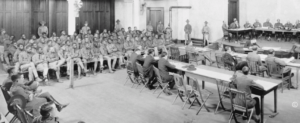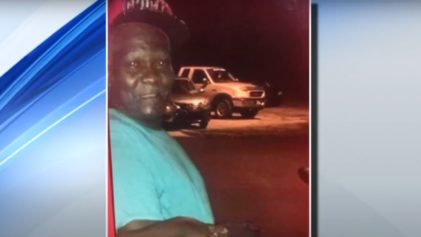
The court martial for Camp Logan soldiers, the largest in U.S. history. (Image courtesy of Prairie View A&M)
On this day in 1917 in Houston, Texas, 156 members of the all-Black 3rd Battalion, 24th Infantry took the lives of four soldiers and 15 white civilians in a battle that what would become known as the Camp Logan Mutiny, or the Houston Riot of 1917.
The unrest, which lasted just two hours on a hot, rainy night, is recognized as the only race riot in U.S. history where more whites than Blacks were killed, according to a historic essay detailing the event on Prairie View A&M University’s website. The killings not only led to the largest murder trial in American history, but also the largest court martial to date.
In the months following the riot, 13 “Buffalo Soldiers” were summarily hanged at Camp Travis in San Antonio, although observers at the court, and even historians, noted that there were no reliable witness accounts to prove the soldiers participated in the unrest.
Sixty-three other members of the 24th Infantry were sentenced to life behind bars while another six soldiers were lynched at the Camp Travis site in September 1918, the essay stated. Those six men were reportedly identified as having fired their weapons on white civilians.
The arrival of African-American troops in Texas during the height of the Jim Crow era was met with fierce opposition from the start.
The racially charged incident came after Houston was awarded a $2 million contract to build an Army training facility there in preparation for the first World War. Claiming a fear for the safety of their families, white fathers asked that no Black soldiers be stationed in their city while other locals feared that the assemblage of armed African-Americans would intensify local Blacks’ “desire for better treatment.”
“In striking their deal with the federal government, Houston officials had promised ‘in the spirit of patriotism’ that there would be no racial trouble [and] that Black soldiers would be welcomed,” the report stated. “But the city’s whites had no such intention of opening their arms to the 24th, regardless the length of their stay.”
In a city where Black occupants were openly disrespected and threatened with racial slurs by police and locals alike, the Buffalo Soldiers gradually fought back by refusing to sit at the back of the trolleys, as mandated by Jim Crow law. Their “insolence” led to predictably harsh encounters with police and white Houstonians, according to the report.
Racial tensions came to a head on the night of Aug. 23 when the Chamber of Commerce planned a festive “watermelon party” to welcome the Black soldiers. A night of frenzied violence ensued instead.
The troubling turn of events began that morning when patrolman Lee Sparks, who was known for his brutal treatment of Blacks, and his partner, Rufus Daniels, chased a man suspected of participating in a dice game. The man ran into the home of a Black woman, who police arrested and accused of hiding the assailant.
When a Black soldier nearby asked what was going on and offered to get clothes for the scantily clad woman, Sparks pistol-whipped him and supposedly said, “That’s the way we do things in the South. We’re running things not the damned n—–s.”
Later that day, Corporal Charles Baltimore became involved after asking about the first soldier’s arrest. He was also beaten and arrested by Sparks, according to the essay.
Baltimore was eventually released from the police station, but by then, rumors had started to swirl that the corporal was unjustly beaten, taken to jail and murdered. There were also talks that an angry white mob was headed to Camp Logan. That’s when a number of Black soldiers broke into a supply tent, stole weapons, and began firing randomly into the night after someone yelled, “Here they come!”
Led by First Sgt. Vida Henry, more than 100 soldiers then marched toward the jail to free their comrades. In the wake of the rebellion, 118 African-American soldiers were arrested, charged with murder and mutiny, and taken to a stockade to await their court martial. In all 19 Black soldiers were eventually hanged and sixty three were given life sentences in retaliation for the events.


